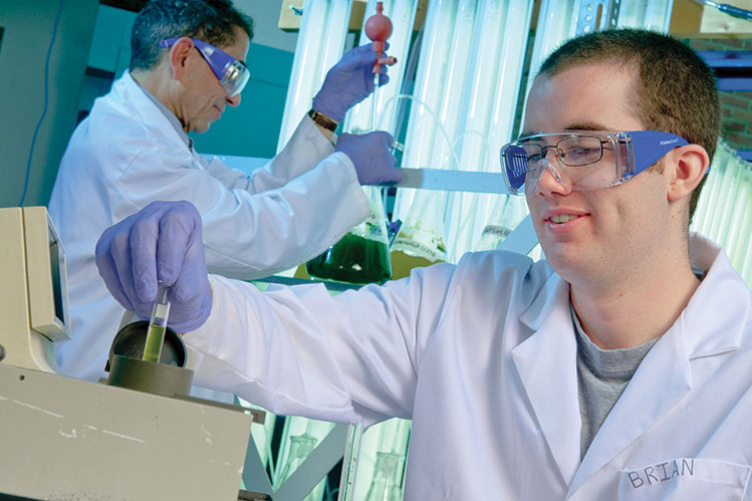
Jeffrey Halpern, an assistant professor of chemical engineering, is conducting research into diagnostic sensors that can be used in a doctor’s office to adjust patients’ medications in real time. Halpern’s colleague, assistant professor of chemical engineering Kyung Jae Jeong, is carrying out tissue-engineering research that could one day lead to regenerating human bones. Xuanmao Chen, an assistant professor of neurobiology, is exploring how genetic defects at the cellular level might contribute to depression, obesity and brain aging.
“Historically, a lot of the biomedical research at UNH was done by individuals with individual grants, but we recognize that addressing the pressing health issues facing our nation will require us to ensure research is not taking place in silos.”
These three projects are among many that are getting a boost from a five-year, $10 million grant UNH received in August from the National Institutes of Health. This Center of Biomedical Research Excellence, or COBRE, grant is aimed at accelerating the translation of basic biomedical and bioengineering research at UNH into clinical and commercialization opportunities that will lead to improved diagnosis and treatment of diseases — in part by creating and fostering interdisciplinary research teams.
“Historically, a lot of the biomedical research at UNH was done by individuals with individual grants,” says Jan Nisbet, senior vice provost for research. “But we recognize that addressing the pressing health issues facing our nation will require us to ensure research is not taking place in silos.” The COBRE grant, a first for UNH, allows for the creation of a Center of Integrated Biomedical and Bioengineering Research that will advance clinical research, commercial opportunities and translational medicine. The COBRE will bring together biomedical and bioengineering faculty and students from many departments in the College of Liberal Arts, the College of Life Sciences and Agriculture, the College of Engineering and Physical Sciences and the College of Health and Human Services.
The grant also enables UNH to purchase state-of-the-art instrumentation for its core biomedical research facilities and to provide additional mentoring and career development opportunities to its early-career faculty. Initially it will fund five junior faculty members, with the expectation that new junior faculty will join the center when the current researchers receive independent NIH funding and “graduate.”
W. Kelley Thomas, Hubbard Professor of Genomics and a member of the COBRE leadership team, says the faculty-mentoring plan will help these five basic biomedical researchers — Halpern, Jeong, Chen, Sergios Chartnikov (psychology) and Edward Song (electrical and computer engineering) — discover the clinical relevance of their work. “It is important for all of us to see the research move outside the isolation of a lab and right to the bedside,” he says.
Rick Cote, chair of the department of molecular, cellular and biomedical sciences and principal investigator for the award, says the COBRE is the culmination of years of work and a reflection of UNH’s strong commitment to interdisciplinary research and teaching. “The university has made strategic investments in its biomedical and bioengineering faculty as well as its research infrastructure,” he notes. “This grant allows us to increase the capacity of researchers to develop clinically relevant tools and treatments.”
Originally published in UNH Magazine Winter 2018 Issue
-
Written By:
Erika Mantz | Communications and Public Affairs | erika.mantz@unh.edu

















































